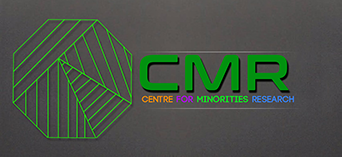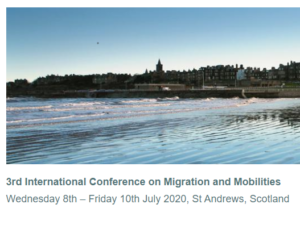The conference will be Wednesday 8th – Friday 10th July 2020, St Andrews, Scotland
Check out the conference website here.
The 3rd International Conference on Migration and Mobilities (iMigMob) is being hosted by the University of St Andrews 8th-10th July 2020. This three-day conference builds on the successes of the first two iMigMob conferences (in Loughborough in 2016 and Plymouth in 2018) in bringing together scholars from a range of disciplinary perspectives to discuss the latest research in migration and mobilities.
|
If you would like to present at iMigMob 2020, please submit your abstract to [email protected] by 14th February 2020. When submitting your abstract, please ensure you include the following:
Please note abstracts must be of no more than 300 words. |
This conference is orientated around the four themes, which have been chosen to reflect key contemporary conceptual and policy concerns:
| Internal migration and urban change, keynote speaker: Prof Darren Smith, University of Loughborough
Concerns about inequalities and the unaffordability and insecurity of housing are rising up the political, policy and academic agendas. This theme encompasses scholarship in population geography and beyond on pressing concerns such as residential segregation, gentrification and shifting patterns and processes of internal migration. We welcome papers on these and other topics that are relevant to other issues of urban change, residential mobilities and internal migration. |
| Forced migration and bordering, keynote speaker: Prof Nick Gill, University of Exeter
The advent of the big data epoch and advances in computing power present significant opportunities for researchers to better understand and visually represent the everyday mobilities of people across space. However researchers are still grappling with ongoing challenges surrounding the accessibility and representativeness of these data and with how to analyse such overwhelming quantities of information. This theme encompasses these issues and we particularly welcome papers which showcase advances in our ability to visualise population mobilities. |
| Visualising mobilities, keynote speaker: Prof Alex Singleton, University of Liverpool
According to the UN High Commissioner for Refugees, we are now witnessing the highest levels of displacement on record. An unprecedented 71 million people around the world are forcibly displaced from their homes, with 26 million classed as refugees (over half of whom are under the age of 18). Understanding the involuntary movement of populations, and the responses of states to them through bordering practices, is thus a key contemporary issue of concern for migration scholars as well as governments and NGOs. We welcome papers which engage with issues of forced migration and the practices of bordering that are deployed in response to them. |
| European migration in turbulent politic, Keynote speaker: Dr Kate Botterill, University of Glasgow
Contentions around migration arguably sit at the heart of the key geopolitical fractures of our times. In this theme we seek to explore how understandings of migration might need to be rethought in light of ongoing political turbulence in the European context. As such we welcome papers that engage with topics such as Brexit, the European refugee crisis, the rise of anti-immigrant sentiment across Europe and the politics of anti-immigration controls. |
Key Dates:
Registration Open: 20th December 2019
Abstract Submission Close:14th February 2020
Early Bird Close:14th March 2020
Registration Close:9th June 2020

